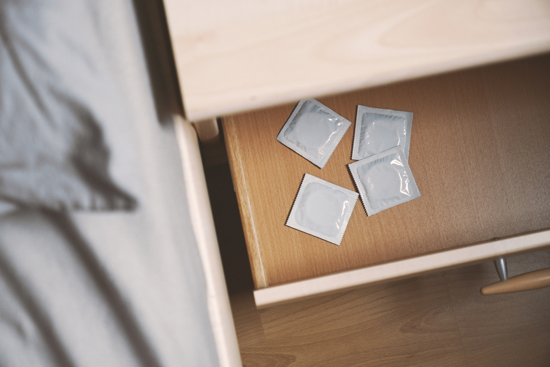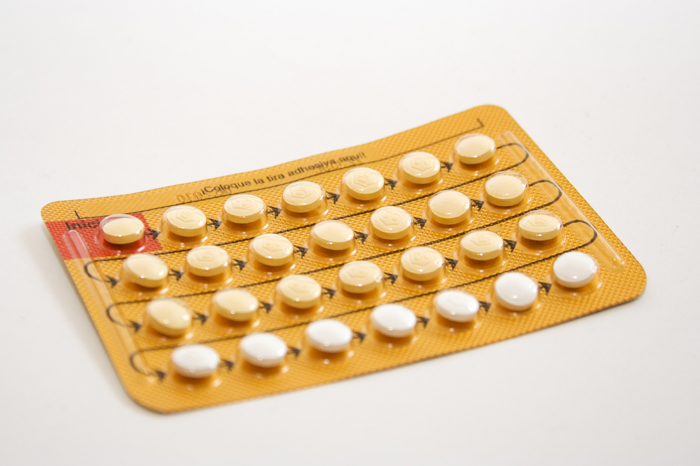The contraceptive pill is often used as the name of all forms of contraception taken as tablets. Tablet contraception is most often divided into three groups:
- Combination pills: Contain two hormones: oestrogen and progesterone.
- Contraceptive pills with progesterone: Contain only one hormone, progesterone.
- Mini pills: Contain only one hormone, progesterone. Differ from contraceptive pills with progesterone in that they contain a small hormone dose, and that the pills must be taken at exactly the same time every day. Mini pills are almost no longer used.
Overview of all products
- The joint catalogue Felleskatalogen lists all hormonal contraceptives that are used in Norway.
- Hormonal contraceptives that the Norwegian Medicines Agency believes are the safest.
Before you start contraception
Your doctor, public health nurse or midwife will ask you about your health and whether you or someone in your family has had a blood clot, heart disease or other illnesses that may be significant for your choice of contraception. Even if you want to use a contraceptive pill, your doctor, public health nurse or midwife may recommend other types of contraception if they think it is the best thing for you.
Information on the use of contraceptive pills
Your doctor, public health nurse or midwife will tell you how to use the contraceptive pill. In all packages there is an information sheet with important information that you should read when starting with the contraceptive pill. Take the tablets exactly as you are told, or as described in the package leaflet. Contact your doctor, public health nurse or midwife if you have any questions.
Never take the chance to have sex if you are unsure whether the contraception works, for example if you have forgotten to take one or more tablets. Remember that a good option is to ask your partner to use a condom!
The organisation Sex og Samfunn (sex and society) has published an e-book (in Norwegian) written for healthcare professionals, but which is also useful for anyone who uses contraception. See “eMetodebok for seksuell helse”.
Contraception support for young people
If you need the contraceptive pill, contraceptive patch, vaginal ring, contraceptive implant or coil and are under the age of 22 years old, you are eligible for financial support to cover all or parts of the cost of contraception.
Combination pills
Combination pills inhibit ovulation and make the mucus in the cervix thicker so that the sperm cells are prevented from getting through.
How good are combination pills at preventing pregnancy?
Combination pills are very safe when used exactly correctly, but in practice they are less safe because it is easy to forget to take the tablets.
Combination pill benefits
- Reduces the risk of serious infections of the fallopian tubes because the thick mucus prevents bacteria from getting through.
- Causes less menstrual pain and regular bleeding.
- Regular use gives the opportunity to avoid menstruation for two months. Longer menstruation-free periods are also possible; ask for advice from a doctor, public health nurse or midwife.
- Prevents cancer of the uterus, ovaries and colon.
- Can counteract acne.
Combination pill disadvantages
Combination pills can trigger harmless but to some extent unpleasant side effects such as nausea, sore breasts, headaches, decreased sexual desire, vaginal dryness, small bleeds and calf cramps. These side effects often pass, but if they are troublesome it may be necessary to switch to another combination pill or type of contraception.
Combination pills increase the risk of blood clots in veins and arteries. Some combination pills have a higher risk than others of causing a blood clot. All women should start with combination pills that have the lowest risk of blood clots. The risk of blood clots decreases during the first 6 months. Stopping use for more than 4 weeks increases the risk of a blood clot on restart. You should avoid constant starting and stopping. See below for information about signs of a blood clot.
Such pills increase the risk of breast and cervical cancer. They also increase the risk of depression. Talk to a public health nurse or midwife if you notice that you become at all depressed or sad when using a combination pill.
Contraceptive pills and mini pills with progesterone
Contraceptive pills with progesterone inhibit ovulation and make the mucus in the cervix thicker so that the sperm cells do not get through. Mini pills also make the mucus thicker, but inhibit ovulation to a lesser extent.
How good are they at preventing pregnancy?
Contraceptive pills with progesterone and mini pills are safe if you use them just right, but in practice they are less safe because it is easy to forget to take the tablets. Mini pills must be taken at exactly the same time each day to be completely safe.
Benefits of mini pills and contraceptive pills with progesterone
- Reduces the risk of serious infections of the fallopian tubes because the thick mucus prevents bacteria from getting through.
- Decreases menstrual problems, gives less bleeding and in some women bleeding stops altogether.
- Does not increase the risk of blood clots.
- Can prevent uterine cancer and ovarian cancer.
Disadvantages of mini pills and contraceptive pills with progesterone
Contraceptive pills with progesterone and mini pills can trigger harmless but to some extent unpleasant side effects such as nausea, sore breasts, headaches, decreased sexual desire and dryness of the vagina. These side effects often pass, but if they are troublesome it may be necessary to use a different type of contraceptive.
Such pills slightly increase the risk of depression. You must talk to your doctor, public health nurse or midwife if you notice that you are at all depressed or sad when using contraceptive pills with progesterone or mini pills. Some women who use mini pills or contraceptive pills with progesterone experience irregular bleeding or frequent small bleeds. If this is a problem, you can take it up with your doctor, public health nurse or midwife so that you can get a different type of contraception.
Long-acting contraception (e.g. contraceptive implants and hormonal coils)
Other types of hormonal contraception are contraceptive implants, contraceptive patches, vaginal rings and contraceptive injections.
For many women, contraceptive implants or hormonal coils will be a good alternative to contraceptive pills, especially if you find it difficult to remember to take contraceptive pills every day. These contraceptives contain progesterone and do not increase the risk of blood clots.
Contraceptive injections are not suitable for everyone. Contraceptive injections may result in reduced bone mass and should only be used by young women when other contraceptives are not considered suitable.
Blood clots
Blood clots are a rare side effect of combination pills. The risk of blood clots is greatest in the first 6-12 months after starting with a new combination pill. Mini pills and contraceptive pills with progesterone do not increase the risk of blood clots.
Advice for avoiding blood clots
- Use contraceptive pills regularly and avoid unnecessary breaks.
- Do not change the brand if you are satisfied with the contraceptive pill you are using.
- Do not borrow contraceptive pills from others.
- Avoid smoking.
If you have any questions, talk to your doctor, public health nurse or midwife.
Signs of blood clots
Blood clots can occur in the veins of a leg or arm. Occasionally, such blood clots can loosen and follow the bloodstream to the lungs. In rare cases, a blood clot may occur in an artery.
Signs of blood clots
- swelling of an arm or leg
- sudden heavy breathing
- palpitations
- dizziness
- chest pain
- visual disturbances
- numbness of an arm or leg
If you experience one or more of these symptoms, contact your doctor, public health nurse, midwife or emergency room immediately.

Contraception
Information about different types of contraception available in Norway, including birth control pills, condoms, sterilization and more.
Illustration: Buecax/Mostphotos
